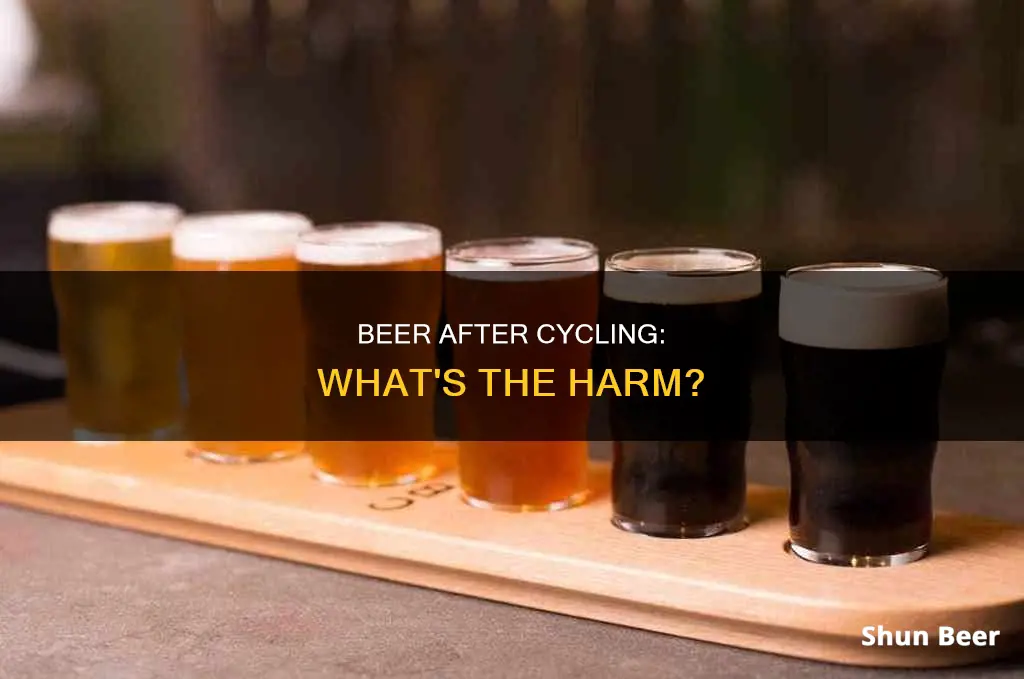
Beer and cycling have long been associated with each other, with cyclists often opting for a cold brew after a long ride. While some claim that beer has several health benefits, including re-energising the body and aiding muscle recovery, others argue that alcohol consumption can negatively impact athletic performance and recovery. So, can you drink beer after a cycle? The answer is complex and depends on various factors, including individual goals and drinking habits. While the social aspect of sharing a drink with fellow cyclists is essential, it is crucial to consider the potential impact on the body, especially when consumed in large quantities.
What You'll Learn

Beer can impair muscle recovery
Drinking beer is a common way to unwind, and many people enjoy a cold brew after a workout or with friends. But what effect does alcohol have on our muscles, particularly when it comes to recovery and repair?
The Impact of Alcohol on Muscle Recovery
Research suggests that alcohol can indeed impact muscle recovery and repair. Nanci Guest, a registered dietitian who studies athletic performance, states that alcohol consumption can block the breakdown of fat for fuel and will impair reaction time and judgment. This is especially important for athletes to consider before their performance.
The Role of Protein Synthesis
The rate of muscle protein synthesis is a key marker in understanding the impact of alcohol on muscle recovery. Studies have shown that consuming 71 grams of pure alcohol, or approximately five beers, suppressed protein synthesis by 24%. On the other hand, consuming 28 grams of alcohol, or about two beers, did not have the same suppressive effect.
The Effect on Testosterone Levels
Testosterone is the primary male sex hormone and plays a crucial role in building muscle mass. While low doses of alcohol (about two beers) have been shown to increase testosterone levels by about 17%, this boost is unlikely to significantly impact muscle growth. In contrast, heavier drinking (around seven beers) has been found to suppress testosterone levels, which can hinder muscle growth and recovery.
The Importance of Moderation
It is important to note that the current evidence suggests that drinking a single beer or two after a workout is unlikely to cause long-term harm or undo your hard work at the gym. However, excessive drinking or making it a habit can impair muscle recovery and hinder your fitness goals.
Non-Alcoholic Beer as an Alternative
Non-alcoholic beer has been found to have some unique qualities when it comes to muscle recovery. Studies have shown that drinking non-alcoholic beer can reduce the risk of upper respiratory infections in athletes and help with hydration during workouts. Additionally, the lower sugar content and higher contribution of certain minerals in non-alcoholic beer can make it a more valuable choice than energy drinks.
The Science Behind Beer: Brewing Chemistry Explained
You may want to see also

Alcohol affects sleep cycles
Secondly, alcohol interferes with the neurotransmitters involved in sleep regulation. It acts as a sedative by interacting with neurotransmitter systems such as gamma-aminobutyric acid (GABA), which inhibits impulses between nerve cells and has a calming effect. Alcohol can also suppress REM sleep, which is when most dreaming occurs. As a result, you may experience more vivid or stressful dreams and remember them more clearly as you wake up more frequently.
Thirdly, alcohol can affect sleep cycles by disrupting circadian rhythms or the biological patterns that operate on a 24-hour clock. It may decrease the body's sensitivity to cues like daylight and darkness, which normally trigger shifts in body temperature and the release of the sleep hormone melatonin. This disruption can lead to feeling alert when you want to sleep and sleepy when you want to be awake.
Finally, alcohol can contribute to the development of sleep disorders such as insomnia and sleep apnea. It can also create a vicious cycle where individuals use alcohol as a sleep aid, leading to poor sleep and increased caffeine consumption during the day, which further disrupts sleep. Experts recommend avoiding alcohol at least three hours before bed to minimise its impact on sleep cycles.
Brita Water Filter: The Ultimate Beer Upgrade?
You may want to see also

Beer can be a gateway to junk food
It's no secret that a cold beer is a refreshing way to cap off a long, tiring day. For cyclists, in particular, it's a well-loved tradition to enjoy a beer or two after a ride. While there are some health benefits associated with moderate alcohol consumption, it's important to consider how it can impact your health and fitness goals.
One of the key concerns is how alcohol interacts with your body's recovery processes. According to research by Evelyn Parr, Ph.D., of the Centre for Exercise and Nutrition at Australian Catholic University, alcohol consumption can disrupt the liver's ability to recover from a strenuous workout. Instead of breaking down lactate and restocking its glycogen stores, the liver is busy dealing with the sudden influx of ethanol. This can lead to impaired muscle protein synthesis and repair, affecting your body's ability to bounce back from intense physical activity.
But that's not all. Alcohol also has the reputation of being a "disinhibitor." Nanci Guest, a registered dietitian who studies nutrigenomics and athletic performance, explains that alcohol lowers your inhibitions, making it harder to resist junk food cravings. So, even if you initially planned on having a healthy salad, a few drinks might lead you to indulge in nachos or wings instead. This is especially true in a social setting, where the combination of alcohol and the comfort of friends can further reduce your self-control.
The impact of alcohol on decision-making is also worth considering. After a ride, your body needs nutritious food, adequate fluids, and rest to recover effectively. However, if you reach for a beer first, you might be less inclined to prioritize a proper recovery meal or shake. Instead, you may opt for another round with your buddies, compromising your body's ability to repair and regenerate.
While the social aspect of sharing a drink with fellow cyclists is important, it's crucial to be mindful of your consumption. If you're an athlete with specific performance and health goals, the negative impacts of regular alcohol consumption can quickly outweigh the benefits. To optimize your recovery and maintain discipline, it's best to keep your drinking in check and ensure it doesn't become a gateway to unhealthy choices.
Parked, Drinking Beer: Legal or Not?
You may want to see also

Beer can be dehydrating
Drinking beer after a long ride or race may not be the best idea, especially if you're looking to improve your performance and recovery. While it's a popular choice among cyclists, there are some important considerations to keep in mind regarding dehydration and its impact on your body's ability to recover.
Dehydration and Recovery
Dehydration is a significant concern when consuming beer or any alcoholic beverage. Alcohol has a diuretic effect, which means it increases the production of urine, leading to fluid loss. This is particularly detrimental after a strenuous workout when hydration is crucial for optimal recovery. The diuretic effect of alcohol can further dehydrate your body, making it challenging for your organs to function optimally.
Impaired Muscle Recovery
Not only does alcohol consumption hinder rehydration, but it also impairs muscle recovery. Alcohol interferes with the synthesis of new proteins, which are essential for building and repairing muscle fibres damaged during exercise. This interference results in impaired recovery and reduced muscle strength for your next session.
Impact on Sleep
The negative impact of alcohol on sleep is another factor to consider. While alcohol may initially make you feel sleepy, as it wears off, you'll transition from deep sleep to lighter sleep. This disruption can affect the repair and regeneration processes that typically occur during sleep, further hindering your body's recovery.
Nutritional Considerations
It's important to be mindful of the nutritional aspects of alcohol consumption. Beer, especially in larger quantities, can provide excess calories and carbohydrates, which may not align with your fitness goals. Additionally, the empty calories from alcohol can displace the nutrients your body needs for optimal recovery, such as carbohydrates for glycogen resynthesis and quality protein for muscle repair.
Social and Psychological Benefits
While the physical impacts of beer consumption can be detrimental, it's worth acknowledging the social and psychological benefits of sharing a drink with fellow cyclists. The camaraderie and social bonding that come with enjoying a beer together can have positive effects on your overall well-being. As Nanci Guest, a registered dietitian studying athletic performance, suggests, it's crucial to take a holistic approach to health and consider the benefits of indulging in moderation.
Beer Drinking at Dana Point: What You Need to Know
You may want to see also

Beer can hinder liver function
After a ride, a beer or two can be detrimental to your health. The liver is responsible for clearing out all the metabolic byproducts from a workout. Post-ride, the liver is in high gear, and when you drink alcohol, it has to work to break that down instead. This hinders the liver's typical post-exercise recovery process.
Evelyn Parr, Ph.D., of the Centre for Exercise and Nutrition at Australian Catholic University, explains that instead of breaking down lactate and restocking its glycogen stores, the liver is busy activating alcohol dehydrogenase enzymes to clean up the sudden toxic spill. This process hinders muscle protein synthesis and muscle repair for up to 24 hours after drinking.
Nanci Guest, a registered dietitian who studies nutrigenomics and athletic performance, agrees that alcohol consumption affects muscle repair and regeneration. She also points out that alcohol can impair your sleep, which is when a lot of the body's repair and regeneration occur.
Heavy drinking after a workout will leave you with less power next time you exercise. Research shows that alcohol magnifies the loss of muscle force after exercise due to impaired rates of muscle protein synthesis, which causes impaired recovery.
Beer, or any alcoholic drink, is also a diuretic, which means it will leave you dehydrated. Dehydration lowers your blood plasma volume, which makes it harder for your organs to function optimally.
Root Canal Recovery: Beer, Yes or No?
You may want to see also
Frequently asked questions
There are health benefits and downsides to drinking beer after a ride. While beer can help you socialise and bond with other cyclists, it can also impair your recovery, muscle repair, hydration and sleep.
According to alcohol and exercise researcher, Evelyn Parr, Ph.D., of the Centre for Exercise and Nutrition at Australian Catholic University, the liver is responsible for cleaning up metabolic byproducts after a workout. When you drink alcohol, the liver is busy dealing with the ethanol, which impairs its typical recovery process.
According to Parr, when alcohol is consumed, especially in large doses, your body is less efficient at making new proteins that are the building blocks of muscle.
According to Nanci Guest, a registered dietitian who studies nutrigenomics and athletic performance, if you don't drink, don't start. But if you drink in moderation, you might get some health benefits. It's all about weighing the cost-benefit and considering your goals.







